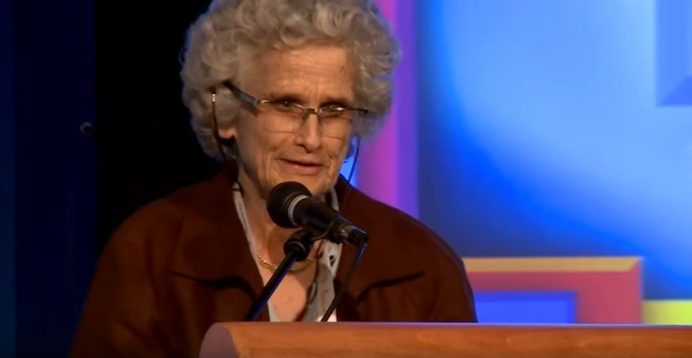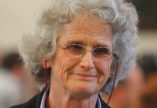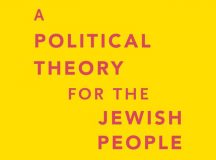Ruth Gavison is Professor Emerita, holding the Haim H. Cohn Chair of Human Rights, in the Faculty of Law of the Hebrew University of Jerusalem and a member of the Israel Academy of Science and the Humanities. She was speaking in London at the 5th Annual Conference of European Association of Israel Studies (EAIS) on 4 September 2016. This is an edited version of her remarks. You can watch the full speech here.
Introduction
Israel is in the middle of a long debate about its identity. This debate moves between specific issues (religion, occupation, and the rights of the Arab minority in Israel) and the most basic presuppositions of the existence of Israel – its Jewish and democratic character, and the way they fit in with its commitment to human rights.
Some people want to emphasise the role of Israel as a nation state for Jews in legislation. The other political camp is trying to stop them. Each camp has its own vision of Israel: what it is and what it should be – a description of reality and an ideal.
Both claim they are repairing the country, invoking an old ideal of Israel, of what Israel was founded for. The canonical text both groups refer to is the Declaration of Independence (the Declaration).
Yet, if we study the Declaration we find three elements. First, there is a very strong affirmation of the right of Jews to have political independence in part of their ancient homeland – the Jewish state. Second, there is a very long, detailed section about the commitment to grant full civil, political, social, economic and cultural rights to everyone in Israel. Third, there is also the commitment to run Israel as a democracy, on the basis of equal and adequate representation of the Arabs within Israel.
So, the key points of the Declaration are Jewish self-determination, human rights and democracy.
When we look at Israel today, and we compare it to Israel in the 1940s and 1950s, I think we can say fairly that it is more democratic than it was back then, that there has been no diminution in its Jewish character and, even in terms of human rights, you can identify quite a lot of progress.
So, why the debate? Why are we disagreeing so sharply? What’s going on?
The erosion of a consensus
First, we have forgotten that democracy, human rights and the Jewish state go together very well.
Jews used to understand this. Not only do they go together well, they are required for each other. The people who struggled to establish the Jewish state knew that they were going to have a democracy and they were very responsive to the idea of human rights.
The international community agreed. It repeatedly recognised the rights of Jews to some kind of independence in Eretz Yisrael, starting with the British mandate. In 1947 the international community declared partition, said that the two states it envisaged would be a Jewish and an Arab state, and that both should be democracies, protecting the individual and collective rights of members of the other people living within them.
There was no question about the relationships between these three elements – democracy, human rights and the Jewish state – being problematic. Clearly this understanding has been lost now in Israel where many people say Israel must choose to be either a democracy or a Jewish state. The Jewishness of the State and its democracy (with human rights being seen – wrongly – as a part of the latter) are seen as a binary set, a zero-sum game.
Second, we no longer fear a strong challenge to the very existence of the State of Israel.
In 1947 Jews felt very threatened by a challenge from people who fought against the establishment of the Jewish state. These people were not interested in the internal Jewish debate about what a Jewish state would be like. They were against the legitimacy of any Jewish state in any part of Palestine. The feeling among the Jews, who had their own disagreements about what form a Jewish state should take, was that they needed to unite against that challenge.
But now Israel is strong and powerful. Some say there is no longer a threat to the existence of the State of Israel. The external necessity that permitted agreement on the Declaration, with its muted internal debate about the role of religion, disappeared.
Third, Israel is no longer the Jewish David versus the Goliath of the Arab world.
The occupation means Israel is no longer the ‘David’ versus the ‘Goliath’ of the Arab world. It is seen by many as an oppressive, dispossessing country; a country that denies the rights of Palestinians to self-determination. This affects the international standing of Israel; it also generates a huge internal debate within Israel; and it is reflected in the relations of diaspora Jews towards Israel.
Fourth, the challenge of the role of religion in Israel is now stronger.
The challenge posed by the religious sector of Israeli Jews seemed in 1948 to be minimal, because although it was very strong ideologically, it was not very strong demographically or politically. This challenge has now become pronounced and acute on many levels. It is very present in Israel in the debate about the role of religion in Israel’s public life and public sphere as well as on the power of religious opposition to renounce sovereignty over the ‘West Bank’.
Fifth, we used to agree to disagree.
We have seen an erosion of the distinction that the Jews made in 1947 between the vision of the State and the political translation of that vision into policies, laws, and structures. The ‘wisdom’ of the Declaration, and of the decisions that the founding fathers and mothers made in the first decades of Israel, was their agreement to disagree. They created a vision that was acceptable, moving and exciting to all. The Jewish state idea was moving to most of the Jews in the State of Israel; democracy was accepted by most, and the commitment to human rights was something that many accepted in principle, while others accepted as a necessary constraint in order to gain the approval of the UN to the new state.
The consensus around this vision was bought by the willingness of all groups to agree to disagree in order to reach compromises. The Declaration itself left many ideological questions open. The translation of the vision into practical policy and action was made by the elected authorities of the State of Israel.
Finally, we used to let politics take the strain.
We decided against adopting an entrenched constitution. We did not give the Declaration the power of law. We did not create judicial review. We tried to set aside all those questions: Who is a Jew? What role does the Jewish religion play in the new state? What is the relationship within Judaism between nationalism, culture and religion? What is the status of the Arab minority and what are its rights? All of these questions were left open. They were left open and they were dealt with politically, by a series of arrangements that Israel made. Israel did create a set of impressive democratic institutions and an independent court, but it refused to transform the elements of its vision into legal questions of principle. Whether Israel was capitalist or a socialist country, a religious or non-religious country, whether God would feature in the Israeli constitution, all these things were things people did not want to decide on. And that agreement not to decide permitted Israel to move on to the urgent challenges.
Polarisation
What we are seeing now is that many of these features of the Israeli consensus are going or gone.
There is no willingness anymore to take the elected government as legitimate, come what may.
The political power balance is changing. The Labor Party, which had been the pivot of all governance in Israel, lost power in 1977. Though it has since been a partner in government, on and off, it has not really resumed governance of the country. So we are now having a long process of changing political and cultural elites. And you see a slow but persistent move of power from the elected branch of government to the professional elites. This is something that the new elected elites resent, so there is not the old willingness to agree to disagree. Instead one sees a tendency to push towards resolution of controversial issues in laws and judicial decisions. After the ‘constitutional revolution’ of 1992, even laws of the Knesset are subject to judicial review for violating human rights or basic constitutional principles.
Everything is now on the table.
We are seeing something else. Everything is now on the table. And not only that. The three interlocked elements of the founding – Jewish, democratic, human rights – are today viewed by many as totally distinct elements, with either major tensions or even outright contradiction between them.
So, increasingly, we find people who want to take one element of the complex vision – Jewish self-determination, human rights and democracy – and make it primary. They give their primary ideal a very rich meaning. They demand that the other two elements will only be operative within the constraints of the rich, primary element. And this happens from all sides of the political and cultural spectrum.
Some are saying, ‘Israel is strong and powerful. No one really denies its legitimacy. It is becoming more Jewish – in both religious and nationalistic terms – than it had been. The proposed legislation adds to processes that have been undermining and eroding democracy and human rights. So you are not only our political adversaries, you are undermining our shared vision of the State.’
From the other side, we hear, ‘ You – the founding fathers on the Left – were the ones who thought Israel should and could and must be a Jewish and democratic state. Now you are giving human rights and democracy such an expansive interpretation that you are diluting the Jewish element of the Jewish state.’
The latter group goes on to complain: ‘You are making us into a state that needs to look like a neutral, liberal state; that privatises all the non-civic identities of all its citizens. You are undermining the understanding that made this state rise and which maintains it. So you are threatening the future survival of the State and its very essence. Because when you deny the legitimacy of the Jewish foundation of the State you are in fact joining the enemies who are still out there and seeking to undermine any Jewish self-determination in the region.’
So, the debates about occupation, about this piece of land or that village, about the Supreme Court, about working on Saturdays on the trains, are not now political issues that need to be negotiated and resolved politically in a dynamic fashion. They are treated as issues that directly pertain to the very vision of the State.
And this polarisation can be dangerous because all states need a shared vision. However we should recall that there are at least two models of states, and hence two kinds of shared vision.
First, the liberal, neutral democracy that seeks to privatise all the non-civic affinities of its population. Now, I don’t think there’s a single country in the world that can actually do that. Indeed, there are debates about whether that is possible or desirable. But, this is a model of liberal democracy. Some say it is the only possible model for a liberal democracy. I disagree.
But we must recognise that within the neutral model of Jewish democracy there is a very interesting tension. Democracy, if we go back to its roots, is about letting the demos decide for itself. Yes, some demos may indeed think it is best for them to privatise all the non-civic identities. (Turkey thought so under Ataturk, for both religion and ethnic identities. It now seems to reintroduce religion into the public sphere, but still denies recognition to all ethnic identities, e.g. the Kurds.) But other political communities may not opt for such privatisation of all non-civic features. If that is the case in a specific state, what does democracy require in that state? Hence, this feature of a state is not dictated by a theory of democracy, or by international law, or by human rights. Rather, this is the decision of the particular demos, and one of the most important it makes.
So, logically, there is a second kind of state, also democratic, in which ethnos, religion and demos are all present in the vision of the state. And in fact there are many states that are either like that or debate whether to be such states. It is enough to mention Belgium and the recent Scottish debate about independence.
Now I think there is no question that, historically and conceptually, the State of Israel was established after a long struggle by people who wanted one state in the world that would be a Jewish state. This is what they wanted then and they still want that. Not only that, but if you look at the Arab minority in Israel, they also don’t want a neutral, liberal, privatising state. They also want a public recognition of their distinct identity. They want a state that gives weight to their non-civic identity. So, in Israel at least, we have a country in which both majority and minorities want ethnos, religion and demos to be, together, present in the vision of the State.
Reconciling Demos and Ethnos through Democracy
How do we deal with the tensions between demos and ethnos? Or religion? The answer that the UN gave, that the Declaration gave, and the answer that we must give today, is that the key is democracy. Democracy is the way for a demos of various identities to think together about how to structure their life together. The state itself is not an ideal. The state is a tool to complete tasks, and the tasks of states are primarily to take care of the welfare, dignity, independence and freedom of their populations.
Now, the problem in Israel and in many other countries, is that neither the demos nor the national and religious groups are homogeneous. Different groups have very different conceptions of ‘the good’ and very different assumptions about the world. For example, the assumption that there is a God in the world is very different from an assumption that there is only humanism and reason. We don’t want to give up on the possibility of people having these two different sets of presuppositions about the world and the cosmos, of people who differ about those questions still being able to live and work together as citizens in a democracy and even as members of the same ethnos.
I think what you are seeing in Israel, and unfortunately in the Middle East, and intriguingly in Europe, is a rethinking about the relationship between individuals, societies, cultures and states.
I suggest that when we think about Israel and its vision, we should think much less about what it means for Israel to be a Jewish state, and much more about what it means for it to be a democracy. The translation of the idea of the Jewish state into the everyday lives of Israelis is a task for the democratic institutions of Israel. On the questions of state, religion, occupation, and the rights of the Arab minority, what must yield the desired results at the end of the day are the democratic institutions of a free society.
Looking deeply at the idea of democracy is a very serious and urgent challenge. In Israel, as in many other countries, there is a reluctance to accept that democracy has implications for the political culture. And the most serious implication of democracy for political culture is that your political adversaries can never be the representatives of evil. You form a democracy with people with whom you have solidarity as fellow members of the demos. They are all citizens of your country. They have equal stakes in its success. So if the country has free and equal elections and civil and political rights, democracy requires that the parties that have lost this time let the winners govern.
There are many things that even majorities cannot do – I am the last person to deny that. Moreover, there are many things that majorities may have the power to do, but that they should not do, for moral as well as political and prudential reasons. But nonetheless, democracy means that you have enough basic trust and respect for your adversaries that you campaign in order to persuade the demos to choose you. But, if you lose, you re-organise yourself for the next campaign. You don’t then start to delegitimise the ones who were elected. Because, if you do that, then it means that you don’t really accept the solidarity of the demos.
If you are the kind of political actor who thinks that if your country goes in a direction that you don’t think is the right, good or necessary one, then it means that this is not a legitimate government – this is a problem for democracy. This is a real problem because democracy does yield bad results. We know this to be true. We don’t support democracy because it is the best system ever. We don’t support democracy because it can never fail. We support democracy because it is the least bad of all regimes that we know. We support democracy because it allows us to be free and active and fight within the political system for change. This is the essence of democracy. You have dynamic challenges, and democracy should be the way you translate your political energies, your civic solidarity and your other kinds of solidarity and try to make your country great.
I am very concerned about many of the processes in Israeli society. But I think it is superficial to say that these processes are the result of the country moving away from democracy and towards being more Jewish, tribal, religious, theocratic, fascist, or whatever. I think these descriptions are not helpful. A robust democracy must maintain procedural guarantees, maintain limits on power, and maintain the independence of many foci of power and authority in society – academia, courts, etc. More: we need to distinguish between shared ideals and political debates. We shouldn’t fight the same way over the two. We should not undermine our ability to maintain democracy and the peaceful change that will serve the interest and preferences of all.
I am not naïve. I am not saying that there is a substantive agreement here. I am not saying that there is a full common interest. I am not saying that the Israeli government is marvellous, not corrupt, and not partisan. It is, it is all of that. I’m not sure it’s much worse than others, but that is not my point. My point is that it is essential for any country, but especially for a divided country like Israel, to hold up its democratic political system as an ideal, seen as legitimate by all. This is something that no one should ever undermine or weaken, because democracy is the only bloodless, peaceful way that a free society can hope to repair itself.
In Israel, the Arab minority and the religious Jewish minority are already strong enough not to be systematically oppressed by the State or others. They have at their disposal enough measures and resources to make their will known and they are effective. And since this balance of power exists, Israel cannot go wrong if all the sectors of Israel learn how to use their resources and powers in ways that will make Israel better, without undermining it. For this we need to have sufficient sense of membership in the democratic institutions of the country. We should repair them, but we should not undermine them, or delegitimise them.
I think the prospects for Israel, if it does that, are better than for other states in the Middle East, which were built without attention to the tensions between demos, ethnos and religious groups by the imperial powers. When these states collapse in a violent and tragic way it undermines not only the autocratic rulers of those states, the ‘bad guys’; the collapse also undermines the rights of everyone else in those countries, rights to freedom, life, security and independence.
So Israel should, can and must be in some sense Jewish, democratic and committed to human rights. And I think it is a good idea – not treason, not stupidity – for all Jews and for all Israelis to accept that this implies not only the commitment to their ethnic, cultural group interests, but it also requires a real feeling of membership and responsibility to the survival, welfare, and thriving of Israeli democracy.






































This very clear and good. Part of the premises is that some nations are spread over several states like pre-unification Germany – and very pertinently the Arab World. Some states contain several nations in a coalition of varying sorts and strengths like the old Tsarist, Ottoman and British empires and still the case of GB itself. Israel is effectively two nations in one state and nations can easily be defined by language, religion or geography or a historical experience; but it does not follow that they have to be defined by the full flush. Some further reference to details in examples as above might have pointed to reforms smoothing the future but pro tem the most interesting would be to develop her doctrine to formality of the ability of the communities within Israel to provide checks and balances.